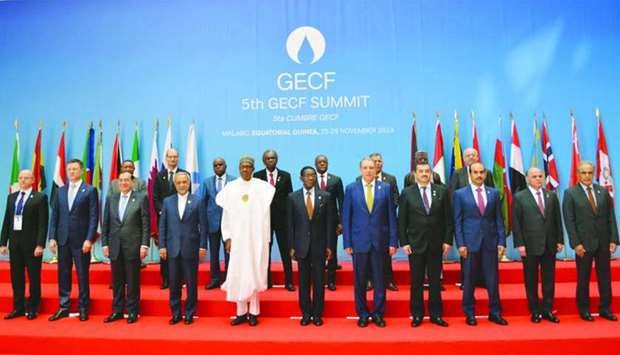*Malabo Declaration calls for using gas as the core source of energy in Africa's development programmes and climate change policies
GECF secretary general Yury Sentyurin said natural gas will be the only hydrocarbon resource to expand its share in the global energy mix from its current 23% today to 27% in a few years, making it a "round-the-clock traded commodity".
Addressing the 5th Summit of Heads of State and Government of the GECF Member Countries at Malabo, in Equatorial Guinea he said the current global energy demand was projected to increase by 30% by 2050.
Fossil fuels are expected to cover approximately 71% of this projected total demand.
The Declaration of Malabo (Natural Gas: Energy for Sustainable Development), which was unanimously adopted, specifically highlights the need to promote the GECF's co-operation with African countries to use gas as the core source of energy in their development programmes and climate change policies, with the aim to overcome energy poverty, enhance development and mitigate CO2 emissions.
This year for the very first time in GECF history, the summit took place in the African continent. Therefore, special emphasis was made not only at solidifying the role of natural gas in a rapidly evolving energy mix, but also at the role that it is playing and would come to play at global energy markets, and in the African region in particular.
Six GECF African members Algeria, Angola, Egypt, Equatorial Guinea, Libya, and Nigeria dominate in total gas production in Africa.
Collectively, they contributed 213 bcm to marketed gas production in 2018, and accounted for 93% of the total gas produced on the continent.
Topics embracing all the chain of the summit side events, have gained further interest among the organisation’s African member countries. They were also of meaningful interest for new market players in the region, such as Cameroon, Mozambique, Tanzania, Democratic Republic of Congo, Gabon, Republic of the Gambia, Mauritania, Senegal and South Africa.
Based on the shared opinion that natural gas is good for Africa, the forum is set to promote further co-operation with African countries to use gas as the core source of energy in the development programmes and climate change policies, in delivering energy to the continent’s consumers, more generally in alleviating energy poverty.
Given the largest natural gas resources in the world, as well as viable share in gas production and trade, the leading position of the GECF member countries is widely acknowledged on the global energy market.
Recalling the declarations of the GECF summits held in Qatar in 2011, Russia (2013), Iran (2015), and Bolivia (2017), the GECF works to protect the interest of its member countries and to support sustainable development efforts through facilitating access to affordable, safe and clean energy for all.
In the era of energy transitions, introduction of discriminatory regulations against cleaner hydrocarbon fuels such as natural gas, disturbs gas markets design, undermines investment in crucial gas infrastructure and new gas supply projects.
Official delegation from Algeria, Egypt, Libya, Qatar, Russia, Trinidad and Tobago, UAE, Venezuela, Angola, Azerbaijan, Norway and Oman participated in the summit at the Ministers and high-level officials’ level.
The meeting was attended by Nigerian President Muhammadu Buhari and Iran’s Vice-President Nahavandian Mohamed Agha.
Sanusi Barkindo, OPEC secretary general; Mahaman Laouan Gaya, APPO secretary general, and Luis Bertran, IGU secretary general also attended the event.

